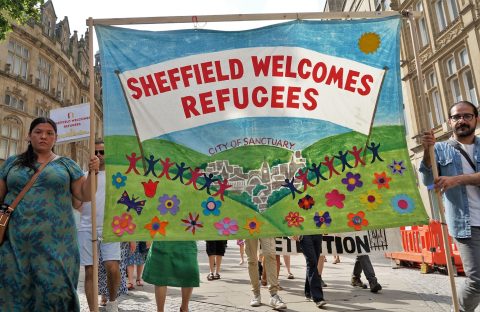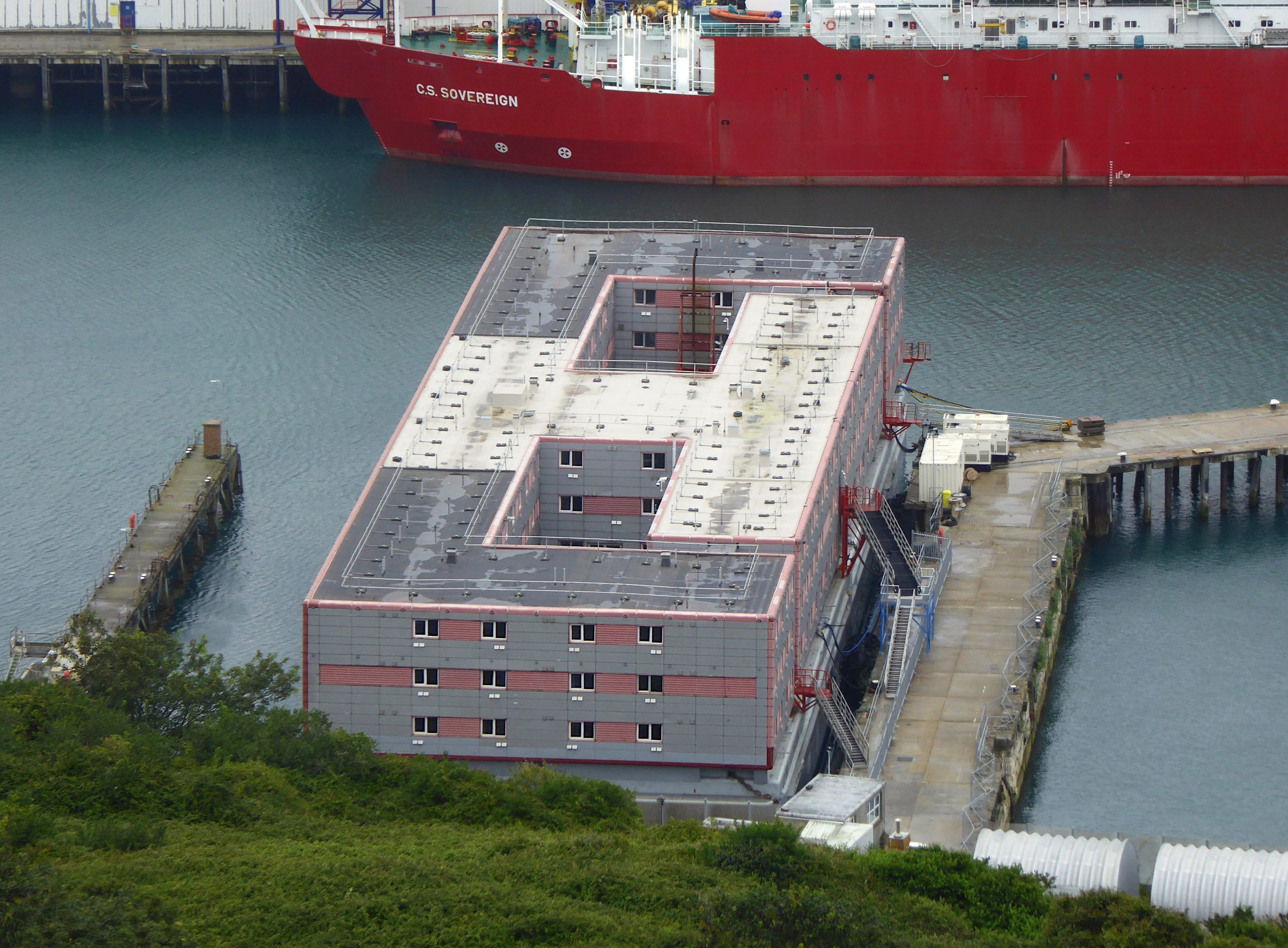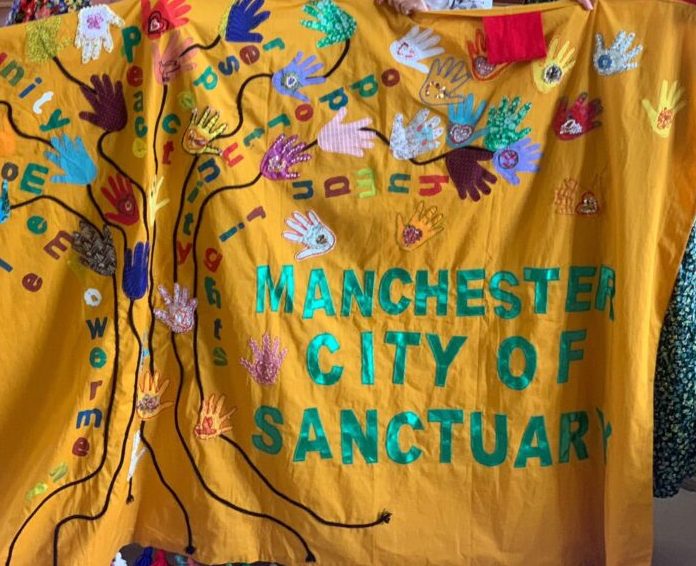Building a City of Sanctuary: Sheffield’s local initiatives supporting migrants
Written by: Caroline Echwald

In this article, Seraphus staff member highlights the work being done to support people seeking asylum and migrants in local communities across the UK. With this, we want to emphasise the many ways in which local initiatives and organisations can make a difference in the hostile environment faced by displaced individuals and migrant communities.
In 2019, I was starting university in the Steel City and found myself captivated by the small-town community feel that weaved through the fourth-largest city in the UK. Coming directly from working in a refugee camp in Greece, I was pleased to learn that beyond its industrial identity, Sheffield possesses a history of supporting displaced people and migrants.
In 2005, inspired by his own immigration journey, Inderjit Singh Bhogal founded City of Sanctuary UK, a movement aiming to establish welcoming and safe spaces for those seeking refuge. Two years later, with the support of the council and over 70 local community organisations, Sheffield proudly became the UK’s first City of Sanctuary. This status is not just a label; it signifies an ongoing commitment upheld every day by local organisations and grassroots networks. This is particularly crucial in today’s increasingly challenging environment for both newcomers and those working to support them.
The hostile environment migrants face in the UK, coupled with the ever-changing policy landscape poses significant challenges to migrants and asylum seekers. An ongoing struggle that has become a prominent concern in Sheffield is ensuring decent housing for vulnerable individuals who are left destitute by government policies. However, Sheffield’s migrant solidarity network extends far beyond immediate needs, as illustrated by collaborative efforts of organisations like Assist Sheffield, South Yorkshire Refugee Law and Justice (SYRLJ) who work hand-in-hand to provide refused asylum seekers a way out of destitution by working to regularise their immigration status whilst providing basic essential services such as housing and food. These organisations work with migrants to address the systemic challenges they experience, advocating not only for material and practical support, but also for changes to unjust legal structures.
One great example of this is the work of migrant-led South Yorkshire Migration and Asylum Action Group (SYMAAG). Established in 2007, SYMAAG plays a crucial role in connecting various elements of the movement. Their work ranges from actively interrupting deportation raids, to the Justice for Simba campaign (which successfully saw Simba’s refugee status granted and his extortionate NHS fees dropped), to challenging ‘internal borders’ that bar members of our community from accessing basic services like healthcare. This initiative directly engages with the voices of migrants and asylum seekers, transforming the solidarity movement into a community-driven partnership, that works to advocate with members of the community who have migrant backgrounds.
As an outsider to the UK and after living in Sheffield for five years, I have witnessed how this collaborative network brings together native residents and newcomers alike, creating a community that works together to make the city a welcoming place for all. From the law students who assist in legal advice clinics, to those who have already made Sheffield their home who translate and support newcomers, to the retired Sheffielders with time to cook up free meals and rally at any time; People from across the city coming together to offer a diverse set of skills and experiences is a testament to how we can all play a part in making a difference.
My experiences from Sheffield, both the successes and challenges, speak to the power of local organising and how crucial having support available in a community truly is. While much can be said about the former and current government’s attempts at exacerbating the challenges for people coming to the UK and pushing responsibilities onto already pressured local councils, it is crucial to recognise that we have the ability to support the individuals we share this city with.
Seeking asylum in the UK can be challenging, so it’s a good idea to have qualified and regulated immigration lawyers by your side to help you through the process.
Related Articles
-

The case for dignified asylum accommodation
Written by: Caroline Echwald
The Institute for Public Policy Research (IPPR) recently released a compelling report highlighting the urgent need for a shift in how asylum accommodation is managed in the UK. With annual costs for housing and supporting asylum seekers in the UK now at a staggering £41,000 per person, up from £17,000 in 2019/20, the current system is unsustainable. […]Read article -

Extending your visa or re-applying to stay in the UK with your family? Watch out for the fee increase on 24 July 2024
Written by: Jane Taylor
Although there was a highly publicised increase in fees for immigration applications in October 2023 and to the Immigration Health Surcharge (IHS) fees in February 2024, there have been other increases brought in gradually since that time in April and July 2024. Amongst these changes, it is largely underreported that there is scheduled to be […]Read article -

A welcoming Manchester: How local initiatives support migrant communities
Written by: Sara Visan
In this article, Seraphus staff member highlights the work being done to support people seeking asylum and migrants in local communities across the UK. With this, we want to emphasise the many ways in which local initiatives and organisations can make a difference in the hostile environment faced by displaced individuals and migrant communities. Moving […]Read article
Categories: AsylumSeraphus News
